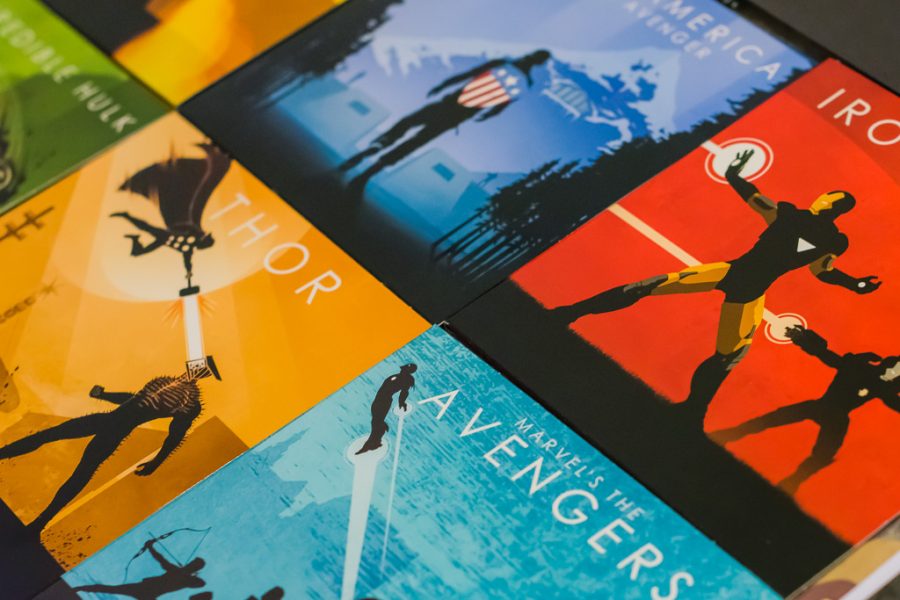When Marvel Studios defies the formula, they find success
“Marvel Cinematic Universe” by mrchrismjackson is licensed under CC BY 2.0
Movie covers for the Marvel Cinematic Universe classics. The MCU is known for its spectacular visuals, and characters, but is also known for its repetitive plotlines. In recent years, the universe has found even more success when it pushes past its own boundaries.
Movie franchises often face the critique that their movies follow a set pattern. One of Marvel Studios’ biggest critiques has been their consistent use of a “formula.” This said formula follows a strict two-act, four-part storyline.
The movie will start with the introduction of a powerful object and subtle hinting of how the hero, generally a white man, can stop it. The second half of the first act generally ends with some sort of trial that the hero faces that almost breaks them. The audience then gets a surprise reveal, whether it be a villain or a plot point, that is essential to the development of the character. Finally, the movie ends in some sort of “big battle” that pushes the hero to become something better.
Some of the films feel like they are straight off the conveyor belt, just different flavors of movies. Following a formula is safe as long as the audience enjoys the movies, but by not breaking the mold or developing new storylines, the studio risks boring and even losing fans.
In more recent years, Marvel Studios has broken its mold and produced movies that did not follow all four parts. In a superhero movie, a big battle is expected and sometimes inevitable, but there are four movies that defy the formula enough to be considered.
“Captain Marvel” and “Black Widow” defy the formula by showcasing two women as their leading characters. “Captain Marvel” was the first Marvel film to star a woman in 2019. The other female lead movie is “Black Widow.” Fans were treated to a film about a recently departed Avenger who had been with fans since 2010. Both movies had audiences divided, but there was no doubt they both defied the formula in a special way.
Marvel Studios further demonstrated inclusivity with an Asian and hero in “Shang-Chi and the Legend of the Ten Rings” and the introduction of deaf superhero Makkari in “Eternals.” However, these films follow the same plot structure. Marvel’s real success comes from the movies that break the repetitive plot formula with new methods of storytelling.
Thor, a beloved MCU character, has been entertaining audiences since 2011 with witty jokes, comedic timing, and being the epitome of the “benevolent alien” trope. Unfortunately, fans and critics found his early solo films lackluster and flat. Then Taika Waititi, the savior of the “Thor” franchise, stepped in to direct the newest “Thor” film.
“Thor Ragnarok” broke boundaries for the MCU. The film strayed away from the formula by revealing the biggest twist, Hela’s lineage, in the trailer and lacked the “object.” Waititi even went as far as to destroy the iconic hammer that Thor wielded throughout the first films. The only thing that “Thor Ragnarok” kept from the formula was the trial, but it was done in a way that pushed the “Thor” movies past the expectation of audiences.
Up until 2018, there was not a single MCU film that starred a person of color. Director Ryan Coogler and the cast of “Black Panther” changed that. The movie, starring Chadwick Boseman as T’Challa, tells a story of honoring ancestry, family and the absence of family, and the ideals of self-determination.
“Black Panther” lacked the “surprise villain” and powerful object, and instead chose to focus on family and the meaning of heritage. It is recognized as the best Marvel movie to be released by fans and critics alike, garnering a nomination for Best Picture and becoming the first MCU movie to win Best Costume, Best Original Score, and Best Production Design.
The newest Marvel era comes in the form of streaming TV shows, because of this the two-act formula does not apply. This allows Marvel to branch out and create new types of fan-approved content with great success.
“Wandavision,” a nine-episode limited series, was the first of the new Marvel television shows to grace the screens. The series starred Elizabeth Olsen as Wanda Maximoff, a.k.a. Scarlet Witch, and Paul Bettany as Vision. “Wandavision” was nominated for 23 Emmy Awards and won Outstanding Fantasy/Sci-Fi Costumes, Outstanding Original Music and Lyrics, Outstanding Production Design for a Narrative Program (Half-Hour).
“The Falcon and the Winter Soldier” was the next Marvel show to grace the Disney+ screen. Centered around Sam Wilson, Anthony Mackie, and Bucky Barnes, Sebastian Stan, they must work together to find out who is the real “villain” in a world defined by magic, powers, and true evil. The show was loved by fans for its unique concepts and was nominated for five Emmys.
Loki defied the formula in his own TV show. The series introduced the most groundbreaking idea in the MCU yet–the multiverse. “Loki”’s finale created infinite possibilities for the future of the MCU. Comic book storylines, new characters, and new iterations of beloved characters are all at the advantage of writers. Fans can honestly expect nothing to be the same as it was.
The most recent addition to the list of “defying” projects is “What If..?.” Marvel Studios broke the formula by animating different iterations of characters we already know. The Watcher, voiced by Jeffrey Wright, guides the audience through multiple different universes where the timeline differs. “What If…?” dove deeper into the multiverse of the MCU, giving audiences their first look at the elusive concept.
Dormant fans of the Tobey Maguire and Andrew Garfield “Spider-Man” movies will get an exclusive look at Marvel breaking formulas when “Spider-Man: No Way Home” releases on December 17.
With a new multitude–and multiverse–of ideas, the future looks bright for the Marvel Cinematic Universe.


